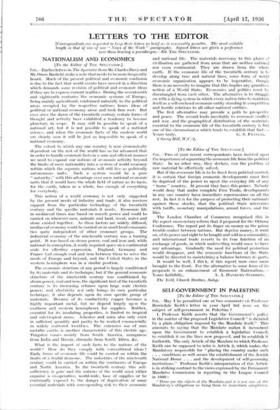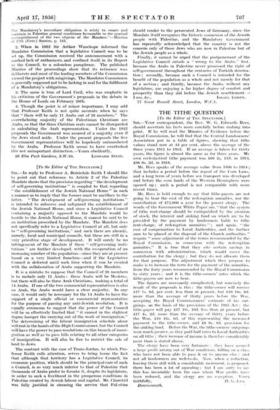SELF-GOVERNMENT IN PALESTINE
[To the Editor Of THE SPECTATOR.]
Sia,—May I be permitted one or two comments on Professor Berriedale Keith's 'letter in your April 3rd issue on the subject of self-government in Palestine ?
1. Professor Keith asserts that the Govenament's policy in the nutter of the proposed Legislritive Council " is dictated by a plain obligation' imposed by the Mandate itself." This amounts to saying that the Mandate makes it' incumbent upon the Government to establish a legislative Council, to establish it on the lines now proposed, and to establish it forthwith. The only Article of the Mandate to which Professor Keith can be supposed to refer is Article 2, which makes the Mandatory responsible for " placing the country under such . . . conditions as will secure the establishment of the Jewish National Home . . . and the development of self-governing institutions." Professor Keith's interpretation of this Article is in striking contrast to the views expreissed by the Perthanent Mandates Commission in reporting to the League Council in 1930 :
" These are the objects of the Mandate, and it'is not one of the Mandatory's obligations to :bring- them to immediate edmpletion.
The Mandatory'a immediate obligation is solely to create and maintain in Palestine general conditions favourable to the-gradual accomplishment of the two object& of the Mandate."—Minutes of 17th (Extr.) Session, p. 145.
2. When in 1932 Sir. Arthur Wauchope informed the Mandates Commission that a legislative Council was to be. set up, the Commission received the announcement with a marked lack of enthusiasm, and confined itself, in its Report to the Council, to a colourless paraphrase. The published Minutes of the proceedings show that its reticence was deliberate and most of the leading members of the Commission viewed the project with misgivings. The Mandates Commission is generally supposed not to be lacking in zeal for the fulfilment of a Mandatory's obligations.
3. The same is true of Lord Cecil, who was emphatic in his criticism of the Government's proposals in the debate in the House of Lords on February 26th.
4. Though the point is of minor importance, I may add, that Professor Keith is not quite accurate when he says that " there will be only 11 Arabs out of 28 members." The overwhelming majority of the Palestinian Christians are Arabs, so that the three Christian seats cannot be disregarded in calculating the Arab representation. Under the 1922 proposals the Government was assured of a majority even if
the Jews stood aside. Under the present proposals the five Government representatives will be hopelessly outnumbered by the Arabs. Professor Keith seems to have overlooked this not unimportant distinction.—Yours obediently, 38 Elm Park Gardens, SJ17.10. LEONARD STEDI.













































 Previous page
Previous page